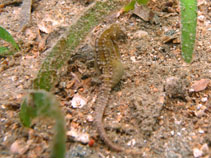| Family: |
Syngnathidae (Pipefishes and seahorses), subfamily: Syngnathinae |
| Max. size: |
8 cm OT (male/unsexed) |
| Environment: |
demersal; marine; depth range 0 - 20 m, non-migratory |
| Distribution: |
Indo-West Pacific: India to southeast Asia. |
| Diagnosis: |
Dorsal spines (total): 0-0; Dorsal soft rays (total): 15-16. Description: (based on 14 specimens): Adult height: 5.0-8.0cm. Rings: 11+38 (37-40). Snout length: 3.0 (2.8-3.9) in head length. Dorsal fin rays: 15-16 covering 2+1 rings. Pectoral fin rays: 13 (12-14). Coronet: low, ridge-like crest. Spines: low, body appears very laterally flattened. Other distinctive characters: double rounded cheek spines and below eye; tail extremely long in proportion to body; slight enlargement of trunk rings numbered (1), 4 and 7 and tail rings numbered 5, 10 (or 9) and 14. Color pattern: usually dark brown all over, but may be mottled. |
| Biology: |
In Zostera seagrass beds; also in estuaries. Length type refers to height (= TL - head length). Ovoviviparous (Ref. 205). The male carries the eggs in a brood pouch which is found under the tail (Ref. 205). Minimum depth reported taken from Ref. 128812. |
| IUCN Red List Status: |
Vulnerable (VU); Date assessed: 27 September 2016 (A2cd+4cd) Ref. (130435)
|
| Threat to humans: |
harmless |
Source and more info: www.fishbase.org. For personal, classroom, and other internal use only. Not for publication.

